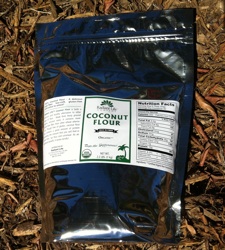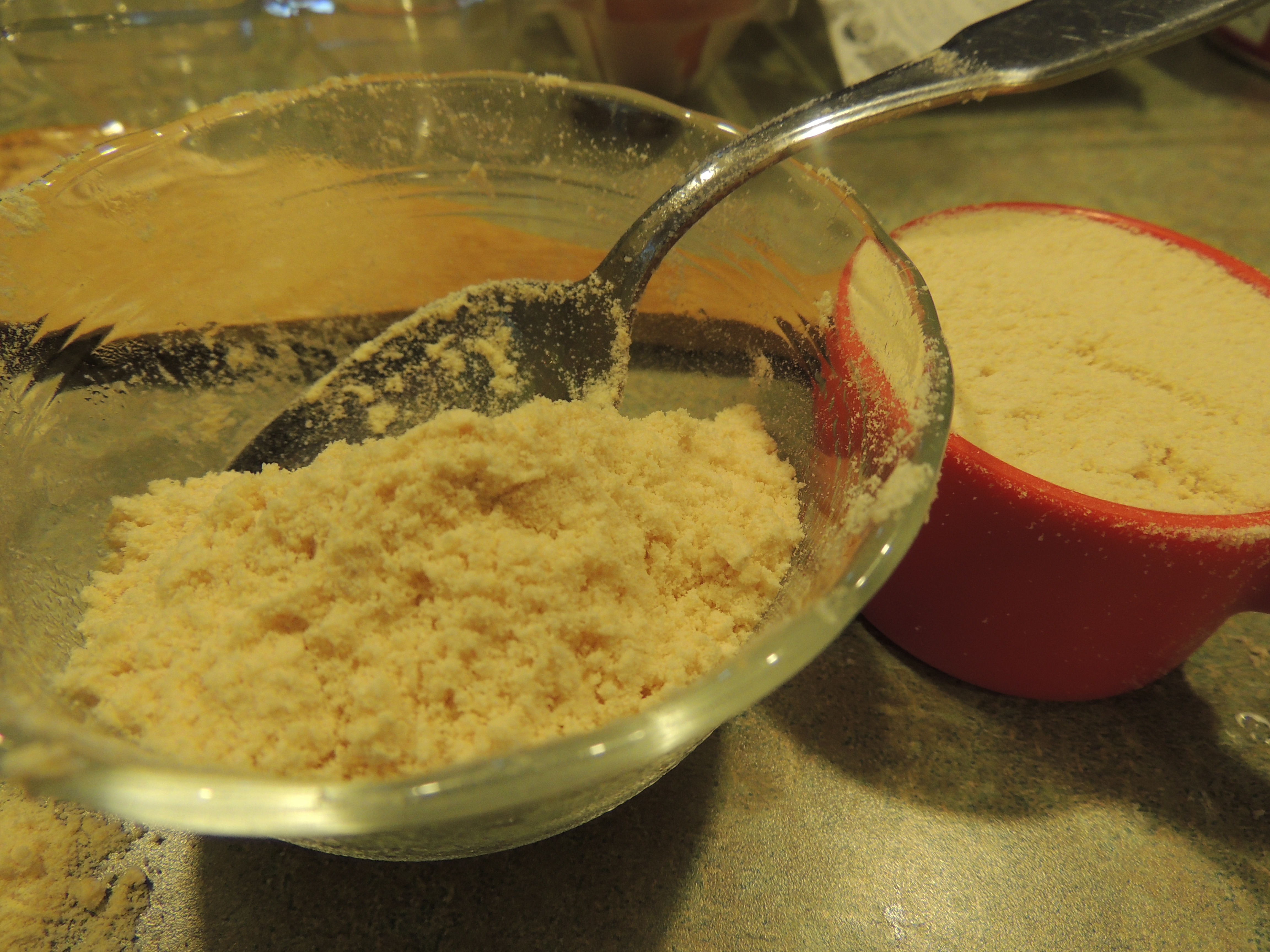Are you exhausted by the scrambled mix of odd flours, thickeners, harsh additives and exotic gums that are often called for in gluten-free recipes? Sometimes it seems as though gluten-free cookbooks, though charmingly organized with their neat black type and enticingly glossy photos, are nothing more than a daunting list of mysterious ingredients. Drowning in the sea of gluten-free alternatives offered on the market today, it can be difficult to decipher which products are actual nourishing “real foods” and which are synthetic marketing ploys meant to cater to the "trendy" gluten-free market. The confusion is understandable- many of the wheat alternatives offered are extremely high in carbohydrates, cruelly bleached, heated or otherwise processed, and many contain irritating soy products. What are we to do? Radiant Life is proud to introduce a new gluten-free addition to our product collection: coconut flour. This refreshingly simple and mouth-wateringly delicious natural wheat alternative may be just the inspiring ingredient you have been searching for.
Coconut flour is an incomparably unique and tasty alternative to wheat and other grain flours. The fine white meal is produced from grinding the dried white internal meat of the coconut. Easily used for delicious baked goods, tasty snacks or hearty main dishes, coconut flour has a distinctive nutrient and fiber composition that sets it apart from more commonly seen rice, soy, nut, potato and corn based flours. As described by Dr. Bruce Fife in his research-supported cookbook Cooking with Coconut Flour, it offers distinctive qualities and health benefits that make it a truly desirable culinary tool.
- High with Indigestible Fiber: Unlike other flours, coconut flour is naturally 75% fiber in composition, containing 9-10 grams per two tablespoons. Fiber is crucial for the maintenance of healthy digestion and elimination processes. By promptly absorbing and promoting the timely expulsion of irritating agents, carcinogens and even parasites, natural fiber is essential for the systematic cleansing and detoxification of the body. Although grains are innately high in fiber, common food refinement processes altogether obliterate this content, leaving sadly devoid clumps of refined flours and sugars in their wake. The result? Although experts recommend that individuals consume between 20-15 grams of fiber daily, the average Westerner consumes a meager 10-14 grams. Capitalizing on this paradoxical discrepancy, food manufacturers and pharmaceutical companies now market an assortment of laboratory concocted fiber additives for flour enrichment programs and supplementation. These synthetic alternatives however, are often more harmful as they are loaded with overly aggressive binders, preservatives and irritating chemicals. Cooking with coconut flour or incorporating it into smoothies, yogurts or sauces is a palatable way to get the proper fiber in your diet in a balanced and wholesome way.
- Rich in Trace Minerals: While most grain products (namely wheat, corn and soy) are mass-harvested on the depleted soils of industrial farms and subject to genetic modification, coconuts offer a refreshing source of naturally occurring trace minerals. Coconut palms are generally found thriving in the mineral-rich volcanic soils of the tropics and naturally fertilized with sea water, which contains a complete mixture of all of the trace minerals required in the human body. Unlike grains, coconuts are also free of phytic acid- a common plant toxin that works as an anti-nutrient. Coconut products are thus an efficient medium through which to absorb a wide spectrum of minerals, without interference from counterbalancing acids.
- Low in Digestible Carbohydrates: Refined flours are concentrated in simple carbohydrates which are rapidly metabolized and cause destructive blood sugar fluctuations in the body. Whether they are elicited from wheat or other grain products, such systemic reactions cause stress responses in the body, resulting in hormonal dysregulation, inflammation and weight gain among other destructive consequences. This is why sugar-rich baked goods and other recipes made with refined flours, have been condemned in many dietary dogmas. In opposition to this trend, coconut flour has been found in several studies to have a glycemic lowering effect. Because coconut meat has a low simple carbohydrate content coupled with a high fiber, it yields a flour that is less disruptive to blood sugar levels. By equalizing carbohydrate metabolism over time, coconut flour results in prepared foods that can be enjoyed in moderation without the gripping fear of an overwhelming glucose buzz.
- Gluten-Free and Hypoallergenic: Allergies and intolerances to all sorts of products are rampant in this day and age, requiring strict protocols that can be difficult to follow and also result in concurrent nutrient deficiencies from the avoided food groups. Sadly, many of the alternatives available for people with specific allergies or intolerances are manufactured and unhealthy, making them subtly destructive in their own right. Naturally bolstering protein, minerals, vitamins and healthy fats however, coconut flour, oil and milk can offer a replenishing source of sustenance for those avoiding specific food groups and struggling to create balanced meals. Few people are believed to be allergic to coconut, and it is often recommended for those with wheat, nut, soy and milk allergies. Many recipes using coconut flour are simple and altogether delicious, providing an efficient way to make allergen-free dishes in your own home that can be packed on the go.
 As with our beloved coconut oil, coconut milk and coconut flakes, coconut flour bolsters a surprising list of nourishing benefits. Radiant Life Coconut Flour has been carefully handled to preserve its delicate nutrient balance. The organic coconuts used to prepare our flour are dried at very low temperatures and then pressed slowly so as not to generate additional heat that would cause denaturation. You will notice that unlike many other brands, Radiant Life Coconut Flour maintains a true white color while staying free of additives, bleachers or preservatives.
As with our beloved coconut oil, coconut milk and coconut flakes, coconut flour bolsters a surprising list of nourishing benefits. Radiant Life Coconut Flour has been carefully handled to preserve its delicate nutrient balance. The organic coconuts used to prepare our flour are dried at very low temperatures and then pressed slowly so as not to generate additional heat that would cause denaturation. You will notice that unlike many other brands, Radiant Life Coconut Flour maintains a true white color while staying free of additives, bleachers or preservatives.
Check out some of our tips for cooking with coconut flour and a No-Sugar Blueberry Muffin Recipe using coconut flour and the leftover wild blueberries from our late-August pickings.
Find our article on The Healthy Home Economist's Monday Mania


